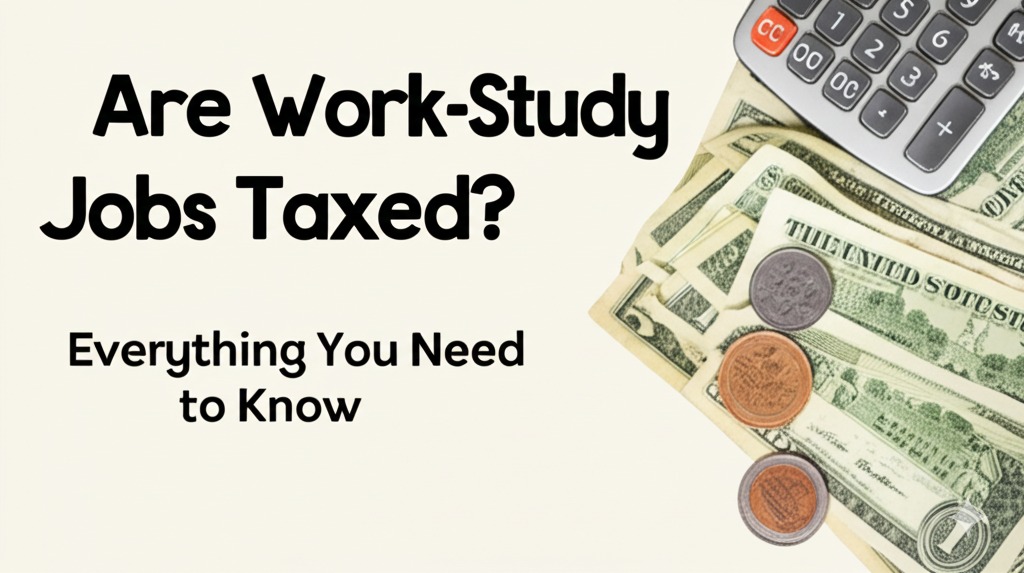
Work-study jobs are a great way for students to earn money while pursuing their education. But one question that often pops up is: “Are work-study jobs taxed?” If you’re a student considering or already working a federal work-study job, understanding the tax implications is essential.
In this guide, we’ll break down the tax responsibilities of work-study income, when you need to report it, and how it may affect your financial aid and tax return.
What Is a Work-Study Job?
Federal Work-Study Program Overview
The Federal Work-Study Program (FWS) is a government-funded initiative that helps students earn financial aid through part-time employment. It’s designed to:
- Provide part-time jobs for undergraduate and graduate students.
- Encourage community service work and work related to the student’s course of study.
- Help students cover education-related expenses.
Jobs can be on-campus or off-campus and typically offer flexible hours that fit around your class schedule.
Is Income from Work-Study Jobs Taxable?
Short Answer: Yes, But With Some Nuances
Yes, work-study income is taxable. Even though it’s a form of financial aid, it’s considered earned income and must be reported on your federal and state tax returns. However, there are a few important things to keep in mind:
- Work-study wages are subject to federal and state income taxes.
- They are not subject to FICA taxes (Social Security and Medicare) if you’re enrolled at least half-time and working on campus.
- Work-study income is excluded from your FAFSA income calculation, so it doesn’t affect your financial aid eligibility.
How to Report Work-Study Income on Your Tax Return
Look for the W-2 Form
If you earned income from a work-study job, you’ll receive a W-2 form from your school’s payroll office by January 31st of the following year.
Here’s how to handle it:
- Include it in your tax return just like any other W-2 income.
- Use Form 1040 or 1040EZ to file your taxes.
- If you had taxes withheld, you may be eligible for a tax refund depending on your total income.
Filing Tips for Students
- File a return even if you earned below the taxable threshold — you might get money back!
- Use free online filing tools such as IRS Free File or TurboTax for Students.
- Don’t forget to check state tax requirements — many states have different rules for student workers.
Do You Have to Pay Taxes on All Student Jobs?
Work-Study vs. Other Student Employment
It’s important to distinguish between work-study jobs and non-work-study jobs, such as:
- Off-campus part-time jobs
- Campus jobs not funded by federal work-study
Both types of jobs are taxable. However, non-work-study wages do count toward your FAFSA income and may affect your financial aid package. Work-study wages do not.
Work-Study and Tax Credits
Can Work-Study Help You Qualify for Tax Credits?
While your work-study income itself doesn’t qualify you for educational tax credits like the American Opportunity Tax Credit (AOTC) or Lifetime Learning Credit (LLC), your overall educational expenses might.
Make sure to:
- Track your tuition, books, and qualifying expenses.
- Use Form 1098-T (issued by your school) to claim education credits if eligible.
- Understand that work-study income won’t reduce your ability to claim these credits.
What About Filing as a Dependent?
How It Affects Students and Parents
If you’re claimed as a dependent on your parents’ tax return:
- Your work-study income is still yours to report.
- It doesn’t change their ability to claim you as a dependent.
- You may still need to file your own tax return if you earned over a certain amount (usually around $13,850 in recent years — but this can vary, so check current IRS guidelines).
Tax Withholding and Refunds
Can You Get a Refund from Your Work-Study Job?
Yes — if your employer withheld taxes from your paycheck and your total income is low enough, you may get a full or partial refund when you file.
Tips:
- Check your W-4 form to ensure the right amount is withheld.
- If you expect to earn below the minimum filing threshold, you can request zero withholding — but only do this if you’re certain you won’t owe taxes.
Key Takeaways
- ✅ Work-study income is taxable, but not subject to Social Security and Medicare taxes if you meet enrollment requirements.
- ✅ You’ll receive a W-2 and must report it on your federal tax return.
- ✅ Work-study wages do not count toward FAFSA income, preserving your financial aid eligibility.
- ✅ You may qualify for a tax refund if too much was withheld or your income was low.
- ✅ Always double-check state tax rules, as they may vary.
Final Thoughts
Understanding the tax rules around work-study jobs can help you stay compliant and maybe even maximize your tax refund. It’s all part of smart financial planning during college.
Need help filing your taxes as a student? Many schools offer free tax prep assistance, and tools like IRS Free File make it easy to file online. Take advantage of these resources and make tax season less stressful!

Andre Cuevas provides career insights, job search strategies, and professional advice to help individuals navigate the job market and achieve their career goals.





